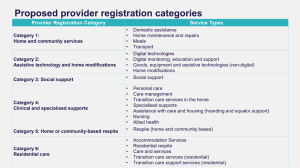The Department of Health and Aged Care presented a webinar last month outlining its proposed new model for regulation of the aged care system – suggesting the new system will be more focused on continuous improvement than punitive measures.
The proposed model will be written into the new Aged Care Act, which is scheduled to go live on 1 July 2024.
Under the proposed model, all providers delivering Government-funded aged care services will need to register to operate in the sector, including sole traders delivering in-home care.
There will be six registration categories – see each category in the slide copied below.

CIVIL AND CRIMINAL PENALTIES
Proposed reforms to quality and safety assessments will mean that rather than delivering pass or fail outcomes, providers will receive a graded assessment.
“Audits will be constructive rather than punitive,” said Caroline Turnour, Assistant Secretary – Harmonisation and Assurance Branch of the Department.
The new model will also give the aged care regulator powers to apply civil and criminal penalties when a provider is “dismissively defiant, engages in game playing, or risks harm to older people.” The regulator will also be given stronger powers of investigation.
Under the proposed new model, the Department will establish a new public register of all providers that consumers can look up and find information about who they are, where they operate, and the services they offer.
RESTORATIVE CARE
Restorative justice, where providers are required to manage complaints in an open and transparent way and everyone is involved in the resolution, will be introduced. The Government will also improve protections for whistleblowers.
Caroline said the new system aims to make regulation proportionate to the risks, with the aim of reducing the regulatory burden.
“Processes will be streamlined to minimise burden on providers, for example through online registration and adopting the principle of collect once, use multiple times in terms of information collection and management,” she said.
You can watch the webinar and read the transcript HERE.
You can read the Consultation Paper Number 2 and provide feedback on the reforms until 23 June 2023 HERE.










